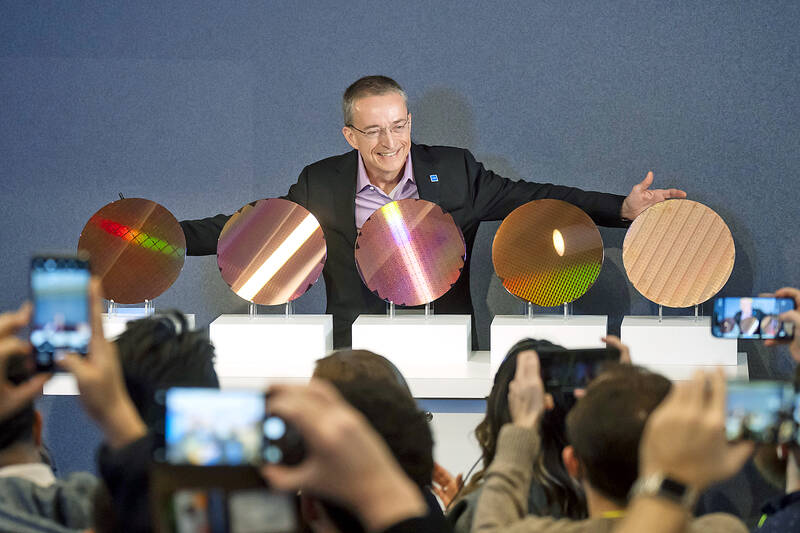Intel Corp, the largest maker of computer processors, tumbled in late trading on Thursday after giving a disappointing forecast for this quarter, signaling that it continues to struggle to defend its once-dominant position in data center chips.
Sales in the first quarter would be US$12.2 billion to US$13.2 billion, the company said in a statement.
That compared with analysts’ average estimate of US$14.25 billion, according to data compiled by Bloomberg.

Photo: AP
Profit would be US$0.13 a share, minus certain items, versus analysts’ projection of US$0.34.
The outlook suggests that Intel CEO Pat Gelsinger still has a long way to go in restoring Intel’s former prowess.
Although the chipmaker’s PC business is recovering, it has been losing ground in the lucrative market for data center chips. The company is also contending with weaker demand at units that make programmable chips and components for self-driving vehicles, as well as a fledgling foundry business.
Intel shares fell more than 6 percent in extended trading following the announcement.
The Santa Clara, California-based company also said it was looking for ways to further tighten its belt.
“We expect to unlock further efficiencies in 2024,” Intel chief financial officer David Zinsner said in the statement.
Intel’s gross margin would be 44.5 percent this quarter. That compared with analysts’ average estimate of 45.5 percent.
The measure is an indicator of how productive Intel’s multibillion-dollar factory network is. Prior to the onset of its current problems around 2019, Intel typically reported profitability of more than 60 percent.
Last quarter, earnings came in at US$0.54 a share on sales of US$15.4 billion. Analysts had estimated earnings per share of US$0.44 and revenue of US$15.2 billion.
Data center sales were US$4 billion, falling short of the average projection of US$4.08 billion. Client computing, Intel’s PC chip business, had sales of US$8.84 billion. That compared with an estimate of about US$8.42 billion.
Intel has said that the PC market is emerging from an inventory glut and its largest customers are returning to ordering parts.
Total PC shipments should rise to about 300 million units a year, Gelsinger has said, aided by demand for new machines that are better able to handle artificial intelligence (AI) software and services.
In servers, where Intel once had a market share of more than 99 percent, the company is facing more competition and a shift in spending patterns.
The frenzy of spending on AI hardware has not done much to help Intel. Most of that money has gone toward so-called accelerator chips made by Nvidia Corp. Those components are better able to handle the massive data requirements of developing AI models.
However, Intel has its own accelerator, called Gaudi, and an improved version should help the company compete, Gelsinger said.
He is also pushing Intel into the foundry business. As part of that expansion, the company is spending heavily on a network of plants around the world, aiming to meet rising demand.
Intel has yet to go public with the names of any of the large customers it has lined up for this project.

TAKING STOCK: A Taiwanese cookware firm in Vietnam urged customers to assess inventory or place orders early so shipments can reach the US while tariffs are paused Taiwanese businesses in Vietnam are exploring alternatives after the White House imposed a 46 percent import duty on Vietnamese goods, following US President Donald Trump’s announcement of “reciprocal” tariffs on the US’ trading partners. Lo Shih-liang (羅世良), chairman of Brico Industry Co (裕茂工業), a Taiwanese company that manufactures cast iron cookware and stove components in Vietnam, said that more than 40 percent of his business was tied to the US market, describing the constant US policy shifts as an emotional roller coaster. “I work during the day and stay up all night watching the news. I’ve been following US news until 3am

Six years ago, LVMH’s billionaire CEO Bernard Arnault and US President Donald Trump cut the blue ribbon on a factory in rural Texas that would make designer handbags for Louis Vuitton, one of the world’s best-known luxury brands. However, since the high-profile opening, the factory has faced a host of problems limiting production, 11 former Louis Vuitton employees said. The site has consistently ranked among the worst-performing for Louis Vuitton globally, “significantly” underperforming other facilities, said three former Louis Vuitton workers and a senior industry source, who cited internal rankings shared with staff. The plant’s problems — which have not

TARIFF CONCERNS: The chipmaker cited global uncertainty from US tariffs and a weakening economic outlook, but said its Singapore expansion remains on track Vanguard International Semiconductor Corp (世界先進), a foundry service provider specializing in producing power management and display driver chips, yesterday withdrew its full-year revenue projection of moderate growth for this year, as escalating US tariff tensions raised uncertainty and concern about a potential economic recession. The Hsinchu-based chipmaker in February said revenues this year would grow mildly from last year based on improving supply chain inventory levels and market demand. At the time, it also anticipated gradual quarter revenue growth. However, the US’ sweeping tariff policy has upended the industry’s supply chains and weakened economic prospects for the world economy, it said. “Now

COLLABORATION: Given Taiwan’s key position in global supply chains, the US firm is discussing strategies with local partners and clients to deal with global uncertainties Advanced Micro Devices Inc (AMD) yesterday said it is meeting with local ecosystem partners, including Taiwan Semiconductor Manufacturing Co (TSMC, 台積電), to discuss strategies, including long-term manufacturing, to navigate uncertainties such as US tariffs, as Taiwan occupies an important position in global supply chains. AMD chief executive officer Lisa Su (蘇姿丰) told reporters that Taiwan is an important part of the chip designer’s ecosystem and she is discussing with partners and customers in Taiwan to forge strong collaborations on different areas during this critical period. AMD has just become the first artificial-intelligence (AI) server chip customer of TSMC to utilize its advanced